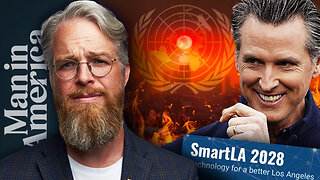Premium Only Content

The Primacy of Emotion: Cultivating Rationality by Understanding Our Deepest Drives
We often tell ourselves that rational thought defines us: we plan, analyze, calculate, and govern our world through logic. Yet beneath these cherished faculties flows a powerful current of emotion, guiding our decisions—often imperceptibly. Emotions are neither trivial leftovers from an evolutionary past nor mere disrupters of objectivity; they’re vital signals, intimately linked to our biology and sense of self. By exploring how emotions influence cognition and by learning to identify and manage them, we foster a more integrated approach to life—one that balances instinct with insight.
1. Emotions as the Engine of Human Behavior
1.1 The Biological Undercarriage
• Hormonal Cascades
Neurotransmitters such as dopamine, serotonin, and oxytocin mold our moods and motivations. Stress hormones like cortisol can shift us into survival mode, narrowing focus while amplifying anxiety or alertness.
• Embodied Influence
Emotions don’t exist solely in the brain. They register in posture, facial expressions, heart rate, and gut activity, interlacing our bodily state with our mental climate. This unity explains why intense feelings can feel physically overwhelming.
1.2 The Myth of Pure Logic
• Cognitive Illusions
We often imagine ourselves acting purely on reason, but behind every “rational” decision lurks an emotional impetus—desires, fears, hopes. Contemporary neuroscience shows that when emotional processing is impaired, even basic decision-making falters.
• Value Assignments
Emotions guide what we find relevant. Without them, we’d be stuck in perpetual indecision, uncertain how to prioritize. Whether setting life goals or navigating relationships, emotions quietly shape the frameworks that reason then refines.
2. The Subtle Dynamics of Emotional Influence
2.1 Framing and Biases
• Selective Perception
In a calm, optimistic state, the brain spots possibilities and patterns more readily; in a stressed, defensive mode, it zeroes in on potential threats, ignoring positive cues.
• Confirmation Traps
Under emotional duress, people often fixate on data supporting their anxiety, jealousy, or resentment, reinforcing the emotional loop.
2.2 Rationalization vs. Reason
• Post-Facto Justifications
We might decide swiftly under emotional pressure, then backfill logic to defend our stance, believing we were objective all along.
• System 1 and System 2
Following Daniel Kahneman’s framework, quick, intuitive “System 1” processes often overshadow slower, deliberative “System 2.” Vigilant self-awareness is needed to keep impulsive responses in check.
3. Gaining Emotional Autonomy Through Self-Awareness
3.1 Observing the Inner Weather
• Naming the Feeling
Consciously labeling an emotion (“I sense irritation” or “This is envy”) reduces its unconscious control. Neural imaging studies show that such labeling can dampen amygdala hyperactivity.
• Tracing Triggers
Uncovering the roots of emotional surges—like childhood patterns or specific stressors—illuminates vulnerabilities, enabling more strategic responses.
3.2 Mindful Interludes
• Breathing Techniques
Even a few slow, measured breaths can reset the sympathetic nervous system, lowering adrenaline rushes and creating mental space.
• Pause and Reflect
Introducing a brief gap before responding—whether verbally or in writing—disrupts reflexive outbursts and invites rational reconsideration.
4. Strategic Integration of Emotions and Reason
4.1 Channeling Emotional Power
• Constructive Fuel
Anger, harnessed skillfully, can protect boundaries without devolving into aggression. Sadness can deepen empathy, fueling altruistic efforts or creative endeavors.
• Cultivating Positivity
Emotions such as gratitude or admiration broaden cognitive scope, promoting more expansive thinking and collaboration.
4.2 Cognitive Reframing and Emotional Alchemy
• Perspective Shift
Interpreting a setback as a lesson rather than a failure transforms frustration into motivation.
• Balancing Opposites
True wisdom arises from aligning heartfelt impulses with analytical discernment, forging decisions that honor both authenticity and practicality.
5. Interpersonal and Societal Dimensions
5.1 Emotional Resonance
• Empathy in Action
Recognizing our own emotional underpinnings paves the way for understanding others’ feelings. This fosters improved communication, conflict resolution, and leadership.
• Emotional Contagion
A single individual’s mood can spread through a team or community, shaping group morale. Cultivating personal emotional balance, therefore, has collective ramifications.
5.2 Moral Implications
• The Drive Behind Ethics
Righteous indignation or deep compassion guide ethical judgments in ways raw logic cannot. Emotions often anchor us to principles like justice or loyalty, which pure reason might treat with neutrality.
• Accountability
Accepting that we’re shaped by emotional processes doesn’t erase responsibility. Instead, it intensifies the call to cultivate emotional maturity—knowing how easily feelings can skew perceptions and actions.
6. Practices to Elevate Emotional Insight and Rational Clarity
6.1 Structured Self-Inquiry
• Journaling
Document daily emotional fluctuations, identifying triggers and resulting actions. Look for recurring patterns—times when jealousy flares, or fear paralyzes.
• Reflective Dialogues
Engage in candid conversations with trusted mentors, therapists, or friends who can offer perspective. Emotional blind spots often appear more visible to others.
6.2 Environment and Lifestyle Factors
• Mind-Body Synergy
Nutrition, exercise, and rest shape emotional stability. Chronic sleep deprivation or poor diet can erode emotional control, magnifying stress responses.
• Digital Boundaries
Constant social media feeds can feed emotional reactivity—careful curation of digital inputs or timed “digital fasts” can restore equilibrium.
7. Conclusion: Embracing Emotions as Partners in Growth
Far from being accidental baggage, our emotions form the pulse of who we are. They imbue choices with significance, galvanize action, and anchor morality. Yet they can also cloud judgment or entrap us in habitual reactions. The path forward involves recognizing emotional currents, neither fighting nor blindly following them, but weaving them into a balanced tapestry alongside reason.
• Acknowledgment: Accept that you are a richly emotional being—not a logic-driven automaton.
• Awareness: Learn to spot emotional shifts, label them, and gently probe their origins.
• Agency: Channel potent emotions toward constructive aims. When necessary, step back, breathe, and allow cooler thought to shape the final decision.
By perceiving emotions not as foes but as essential, intelligent forces, we reclaim power over how we respond to life’s challenges. That synergy—of passion harnessed by awareness, reflection enhanced by feeling—reveals a deeper human sophistication, enabling us to move through the world with both heartfelt authenticity and clear-eyed discernment.
-
 0:57
0:57
FragmentsOfTruth
8 hours agoIllusions of Reality: A Masterclass in Perception, Attention, and the Alchemy of Mind
46 -
 1:29:23
1:29:23
Kim Iversen
4 hours agoTrump TURNS On Netanyahu! Forces Israel To END THE WAR And Stop The Bloodshed
38.6K80 -

Danny Polishchuk
7 hours agoThe Funniest Call In Show On Earth - Live From New York City's Best Comedy Club
32.6K -

Man in America
9 hours ago🚨 RED ALERT! SmartLA 2028, C40 Cities, CA Fires & the UN 2030 Blueprint
36.8K11 -
 59:39
59:39
Flyover Conservatives
22 hours agoLeft for Dead: The Dark Secrets Behind Clinical Trials Exposed - Brianne Dressen, React19 | FOC Show
30.1K -
 5:28:19
5:28:19
Wahzdee
9 hours agoAm I Too Old to Keep Up? New Game? 🤔🎮 - Warzone/Kompete Days! S1E13
49K4 -
 1:08:07
1:08:07
Josh Pate's College Football Show
4 hours ago $1.80 earnedNational Title Prediction | Clemson’s Big Moves | CFB’s Golden Age | USC Childhood Hatred
29.2K -
 1:00:57
1:00:57
The StoneZONE with Roger Stone
3 hours agoShould Trump Pardon Corrupt Mayor Eric Adams? | The StoneZONE w/ Roger Stone
24.6K8 -
 4:09:51
4:09:51
SwitzerlandPlayIT
6 hours ago🔴 LIVE - RANDOM GAMING - Kingdom of Amalur?
42.8K2 -
 31:50
31:50
Standpoint with Gabe Groisman
1 day agoEp. 64. Canada: the 51st State?!
37.5K9